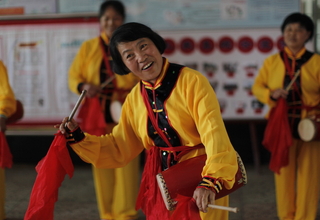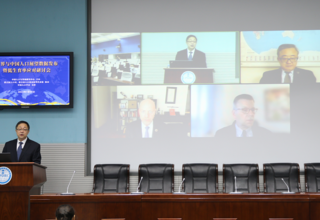(on behalf of Dr. Babatunde Ahonsi, UNFPA Representative in China)
Check against delivery
Dear Mr. Yushao WU, Vice President of CNCA,
Dear Prof. Peng DU, Vice President of Renmin University,
Ladies and gentlemen,
On behalf of the United Nations Population Fund - UNFPA - in China, I would like to extend our heartfelt congratulations for the organization of the “2019 International Meeting on Technology for Ageing in East and North-East Asia” jointly organized by the China National Committee on Ageing (CNCA), the United Nations Economic and Social Commission for Asia and the Pacific (ESCAP), Renmin University of China (RUC) and UNFPA China.
Population ageing is a global phenomenon that is increasingly affecting both developed and developing countries. Population ageing in the East and North-East Asia region is particularly salient due to the high proportion of older persons and the speed of ageing. The sub-region is home to countries such as China, a country which has the largest population of older persons in the world; Japan, a country which has the highest percentage of older persons in the world; and the Republic of Korea, a country which has the fastest rate of population ageing in the world.
In 2018, according to the National Bureau of Statistics of China, the number of people aged 60 and above in China was nearly 250 million. This is equivalent to approximately 18% of the nation’s total population and is far above the international benchmark of 10% in an average ageing society. It also represents a significant increase of approximately 10 percentage points compared to year 1982, when proportion of older persons aged 60+ was 7.6%. The increase in both the number and proportion of older persons in China raises a significant concern about the shrinking supply of labor force and not being able to meet the increasing demand in high-quality care services for older persons.
UNFPA has been working with China for the past four decades since 1979 and ageing has been a core component of our collaboration. Based on our long-standing collaboration, UNFPA views that China will be able to set an example in establishing a national response that would be inclusive and improve the well-being of older persons through application of policy and technological innovations.
The fact that the older persons today and those in the future are very different from their counterparts in the past itself calls for new policy options. Advances in health and social welfare have allowed people to live in longer and better health. When the People’s Republic of China was founded in 1949, life expectancy in China was only 35 years, and in 2018, it had reached 77 years. Accompanying the increase, we have also noted the historical transition of educational attainment of older persons in China: in 2000, about half of the older persons in China had no schooling experiences; and 10 years later in 2010, the proportion of older people with no schooling had gone down to below one quarter, and three-fourths of the Chinese older persons had an educational attainment at primary education or above.
It is anticipated that the 2020 census will report an even greater move upwards in terms of the educational attainment of older persons in China. The combination of extended life span with improved educational attainment makes the current and future generations of older persons in China essentially a pool of resources, rather than a burden requiring care and support. The unprecedented longevity revolution is in fact happening everywhere, but it is progressing faster in Asia, including the countries present at the meeting today.
To reap the potentials of this longevity dividend, efforts and urgent attention should be made on deploying innovative policy options that will empower older persons to remain included in development initiatives as long as they wish and as long as they are physically able. For example, the current retirement age, which was set at 60 for men and 55 for women (even lower if they are involved in heavy workload professions) in the 1950s, has not reflected the significant progress made in increased life expectancy of the Chinese population, and women who live longer are retiring earlier. Changing the retirement policy and postponing the retirement age could be one option, but it probably would not be enough. What would be important and innovative would be the installation of a policy system that will change the traditional trajectory of people from school to work to retirement. In the future, it should be possible for people to move more freely between learning, work and leisure, while enjoying support and protection throughout their life cycle.
The innovative policy options work best against a rapidly developing technological background. The introduction of new technologies changes the nature of work which calls for higher level of expertise, skills and experiences that favor senior age workers, while China’s economy shifts from a labour intensive to knowledge and skills-based production. The combination of policy and technological innovations will prove to be a strong approach to national responses to ageing. With the gains from technological advances, the current and future generations of older persons in China who have prolonged life span and skills accumulated should have the chances to continue a longer professional life in societal development in flexible ways suiting their characteristics.
Technological advances also have a great role to play in terms of providing high-quality care to older persons. There is no doubt that care for older persons is a major challenge in China, particularly if considering the fact that there are fewer children and fewer family members who will play the role of traditional caregivers and greater mobility of China’s population today. Given the continuous social and economic growth and particularly the rapid advancement of technological infrastructures, China in fact has already a lot of the elements required for a sound national response to cope with ageing, focusing on the use of technology. As we have seen on many occasions, for example, the use of robots in rendering services, providing readily available telecommunications among family members who are physically apart, technological innovations are and will continue to play a major role and bring benefits for older persons.
We have to cautiously note that technological innovations, however, do not necessarily always bring positive impact. For example, it can adversely affect job safety of those people who are currently employed, and we need to closely monitor the implications of using technologies in ageing.
As UNFPA, we commit to work with the relevant Government bodies, towards developing relevant policies and strategies that will be based on ensuring the improved well-being of older persons and evidenced on the best practices across countries.
With that, I wish the meeting a great success and I wish you all a pleasant stay in Beijing.
Thank you.




